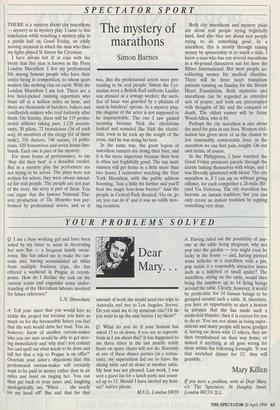SPECTATOR SPORT
The mystery of marathons
Simon Barnes
THERE is a mystery about city marathons — mystery as in mystery play. I came to this conclusion while watching a mystery play in a parish hall on Good Friday, an oddly moving occasion in which the man who fixes my lights played St Simon the Cyrenian.
I have always felt ill at ease with the event that this year is known as the Flora London Marathon. I live my professional life among famous people who have their entire being in competition, to whom sport matters like nothing else on earth. With the London Marathon I am lost. There are a few hand-picked running superstars who blaze off at a million miles an hour; and there are thousands of butchers, bakers and candlestick-makers who trail forlornly after them. On Sunday, there will be 119 profes- sional athletes taking part, 1,120 accoun- tants, 30 pilots, 72 beauticians (36 of each sex), 64 members of the clergy (61 of them male), 356 doctors, 740 nurses, 14 politi- cians, 420 housewives and seven house-hus- bands. Each one is part of the mystery.
For most forms of performance, to say `they did their best' is a dreadful verdict. But in a mystery play the performers are not trying to be actors. The plays were not written for actors, they were always intend- ed for real people. The people are not part of the story, the story is part of them. You can argue that the famous National The- atre production of The Mysteries was per- formed by professional actors, and so it was. But the professional actors were pre- tending to be real people: Simon the Cyr- nenian wore a British Rail uniform; Lucifer was dressed as a sewage worker; the sacri- fice of Isaac was guarded by a phalanx of men in butchers' aprons. In a mystery play, the disguise of the actor is not supposed to be impenetrable. The one I saw gained meaning because Nick the electrician looked and sounded like Nick the electri- cian, even as he took up the weight of the cross. And he was doing his best.
In the same way, the great legion of marathon runners are doing their best, and it is the more important because their best is often not frightfully good. The top male runners will get home in a little more than two hours. I remember watching the New York Marathon, with the public address booming, 'Just a little bit further and you'll beat the magic four-hour barrier!' And the people in Central Park shouted, 'Go on, go on, you can do it' and it was an oddly mov- ing occasion. Both city marathons and mystery plays are about real people trying frightfully hard. And also they are about real people trying to do something good. In a marathon, this is mostly through raising money by sponsorship at so much a mile. I know a man who has run several marathons in a 40-pound rhinoceros suit for Save the Rhino International. But most people are collecting money for medical charities. There will be three heart transplant patients running on Sunday for the British Heart Foundation. Both mysteries and marathons can be regarded as extended acts of prayer, and both are preoccupied with thoughts of life and the conquest of death. The oldest runner will be Jenny Wood-Allen, who is 84.
Perhaps the city marathon is also about the need for pain in our lives. Western civil- isation has given most of us the chance to live reasonably comfortable lives: in the marathon we can find pain, sought. On our own terms, of course.
In the Philippines, I have watched the Good Friday penitents parade through the streets lashing themselves with whips, and I was liberally splattered with blood. The city marathon is, if I can say so without giving offence, for each competitor a 26-mile-385- yard Via Dolorosa. The city marathon has become an instant tradition; but you can only create an instant tradition by tapping something very deep.


































































 Previous page
Previous page